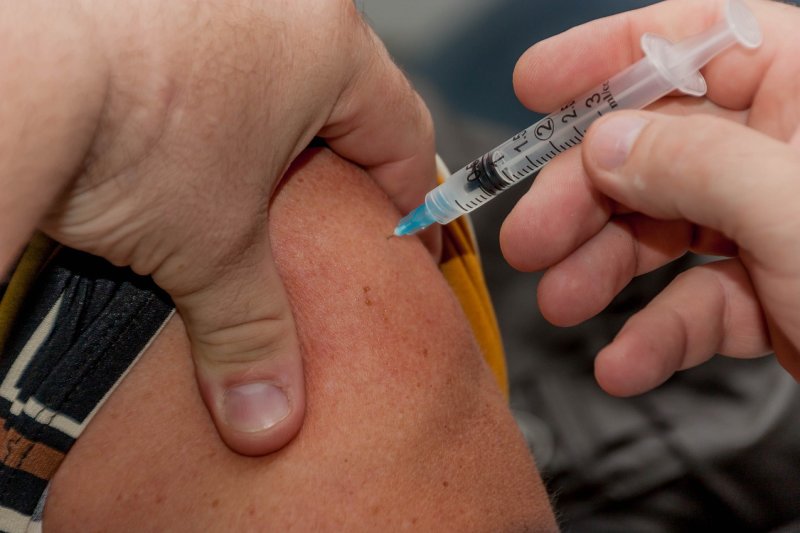Vaccines against COVID-19 are coming soon, but challenges remain. Photo by huntlh/
Pixabay
Dec. 3 (UPI) -- The effectiveness of new vaccines developed to prevent COVID-19 likely depends on how well they are distributed and the degree to which the public is willing to take them, public health experts from Johns Hopkins University and Duke University said Thursday.
The comments came on the same day the U.S. Centers for Disease Control and Prevention's Advisory Committee on Immunization Practices published its recommendations on who should receive the initial doses of vaccine.
The new guidelines suggest that the nation's 21 million healthcare workers -- as well as the 3 million residents of long-term care facilities, which have seen disproportionate numbers of COVID-19 cases and deaths -- should receive priority.
"Any vaccine is not going to be a silver bullet that brings us back to the pre-pandemic period," Dr. William Moss said during a conference call with reporters on Thursday.
While potential vaccines against the virus existing "just about a year after the pandemic was first identified is a truly remarkable achievement, [we] face numerous challenges in rolling out these vaccines," said Moss, executive director of the International Vaccine Access Center at the Johns Hopkins Bloomberg School of Public Health.
To date, two companies -- Pfizer and Moderna -- have applied for emergency use authorization for their vaccines to prevent COVID-19 from the U.S. Food and Drug Administration.
Officials expect doses of one or both vaccines to become available in the United States before the end of this month. However, just how many doses will be ready for use over the next few months remains to be seen.
Although both companies have already begun manufacturing the vaccine -- and the vials needed to deliver them -- in anticipation of receiving the FDA approval, their products must be stored at extremely cold temperatures and require two doses to be effective.
Getting the freezers needed to maintain an inventory of these vaccines will be challenging, particularly in low-income and rural areas across the country, Moss said.
In addition, just as concerns exist that people who live in low-income countries globally won't have access to the vaccines, so too are there worries that poorer communities in the United States will have trouble getting them.
This is due, at least in part, to "deep-seated inequities" in access to quality healthcare services in low-income communities, particularly among people of color, that have become "more exposed during the COVID-19 pandemic," according to Dr. Gavin Yamey.
More than 80% of the Pfizer and Moderna vaccine doses "have already been purchased by rich nations," Yamey, professor of practice, global health and public policy at Duke, said during a call with reporters Thursday.
"We're really not going to really bring this pandemic under control until we control viral transmission everywhere [and] the same inequities we've been talking about globally could happen here if we're not careful," he said.
The National Academy of Medicine recently called for vulnerable populations, including people of color, the homeless and incarcerated populations, among others, to be "vaccinated early," Yamey added.
Still, even if these communities can receive the shots, it doesn't mean they will, he said.
Because of the "legacy of medical experimentation" in some vulnerable communities in the United States -- the syphilis studies in Tuskegee, for example -- people may be reluctant to accept a new, rapidly developed vaccine, he said.
The key will be taking steps to work with community leaders and health officials to build trust and educate the public on what to expect in terms of vaccine safety and effectiveness, Yamey and others said.
In a statement issued Thursday, CDC Director Dr. Robert Redfield said he supports the Advisory Committee on Immunization Practices' recommendations.
He added that he "looks forward to future recommendations that, based on vaccine availability, demonstrate that we as a nation also prioritize the elderly who reside in multi-generation households."
"Often our Hispanic, Black and Tribal Nations families care for their elderly in multi-generational households and they are also at significant risk," Redfield said.
Although clinical trials to date indicate both the Pfizer and Moderna vaccines are up to 95% effective at preventing new COVID-19 infections, with few side effects, questions remain about how long the immunity will last.
It's also unclear how well the vaccines will reduce transmission of the virus, and those who receive them could also develop side effects many months later, Moss said.
"The ideal vaccine wouldn't have cold [storage] requirements and would provide long-term immunity in a single dose, and we may have that at some point," he said.
Until then, the public is still going to need to wear masks, social distance and avoid large gatherings well into 2021 -- if not longer -- to continue to limit spread of COVID-19, according to Moss.
"We are seeing record numbers of cases, hospitalizations and deaths and seeing our hospital systems overwhelmed," he said.
"This is really at a critical juncture in this pandemic in the United States, and it's not the ideal time to introduce a new vaccine," Moss added.















